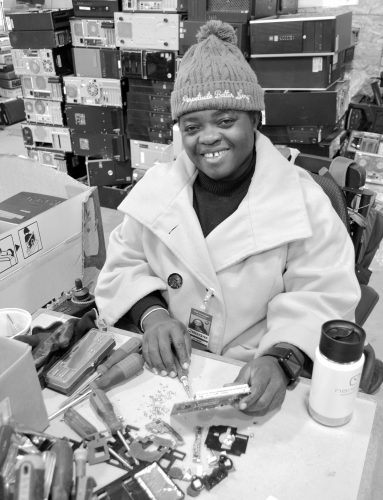
“I spoke Pidgin English as a kid,” says Ruth Acheinegeh, who grew up in the city of Bamenda in northwest Cameroon in Central Africa, until age 3, when she contracted polio. “I had my elementary education in an institution, 50 miles away, that takes care of children with disabilities. Disability was a cultural stigma at the time.” Returning home at age 13, Acheinegeh got around with crutches and a brace on her left leg. “My good leg,” she notes. Her parents hoped that she could learn to type and find a job, but she had greater ambitions. She stayed in school and completed an advanced college certificate in business management at age 28, just as her oldest brother was running the family business, a shop in the city’s main market, into the ground. “I became the first woman to sell at the market,” she says. “My younger brother helped out. Ruthy’s Shop sold basic commodities needed at home: canned foods, milk, sugar, soap, but no perishables.” When a customer brought in an application form for a three-week training for women with disabilities offered by Mobility International in Eugene, she applied, and in 2010 took her first-ever plane ride to attend the workshop. On her return to Bamenda, she launched the Northwest Association for Women with Disabilities, and she later attended conferences in Istanbul and Brazil. At the end of 2016, civil war broke out between English and French-speaking factions in Cameroon. “I got out in February 2017,” says Acheinegeh, who stopped in D.C. for a month to assess her future possibilities. “I’ve been in Eugene since then. I applied for asylum and it was granted.” She volunteered at NextStep computer recycling for a year, until she got a permit to work, and she now supervises and teaches computer dismantling to NextStep volunteers. “My goal is to send computers to Cameroon,” she says, “so that children with disabilities can learn IT.”